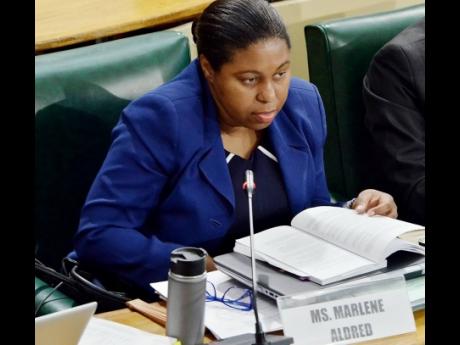(Jamaica Gleaner) Jamaica’s foremost anti-corruption body, the Integrity Commission (IC), has rejected as “misleading” and “false” suggestions by two senior public officials of overreach and entrapment in its verification process of statutory declarations.
Solicitor General Marlene Aldred, during a meeting of the Joint Select Committee of Parliament that is reviewing the Integrity Commission Act, told committee members on Tuesday that it was her view that the commission’s process is sometimes questionable.
Further, Minister of Legal & Constitutional Affairs Marlene Malahoo Forte, too, shared a concern about whether a public official, whose statutory declaration is being verified, is notified if this process triggers or becomes an investigation.
She said that this may be where there are issues with the commission, “the gap in the law and the approach taken, because the natural justice elements will not be satisfied”.
But in a media release yesterday the IC rejected the assertions by the two public officials.
“The solicitor general, Marlene Aldred, is reported as saying that ‘…the director of information and complaints issues a summons, which is the remit of the director of investigation’.
“The Integrity Commission categorically rejects the alleged assertion as false and wishes to advise the public that the director of information and complaints has never issued a summons as he has no lawful authority to do so. The authority to issue summonses lies solely with the commission’s director of investigations,” the release from the anti-corruption watchdog said.
The commission also rejected a statement by Aldred in which she noted that its process is at times questionable, alleging that the verification of statutory declarations sometimes look like investigations.
The commission said that the solicitor general’s statement is misguided and has negative implications.
It said if its director of information and complaints needs additional information from a declarant, regarding a statutory declaration, correspondence which is typically worded as follows is sent to the declarant:
“The Integrity Commission’s examination of your statutory declarations as at December 31, 2018, December 31, 2019, December 31, 2020, December 31, 2021, and December 31, 2022, revealed that additional information is required to complete the review of said statutory declarations. In the circumstance, please provide the following information by Tuesday, January 23, 2024, along with the requisite supporting documents:” and/or “The Integrity Commission, during its third-party verification process, identified information with respect to assets that were not previously disclosed on your statutory declarations. Please note the findings of the commission below:”
The IC said the letter of requisition will close with a request for the declarant to:
“Kindly advise the commission of your interest in………” .
“As such, there is absolutely no overreach and it should also become patently clear that whenever correspondence is sent to declarants, there is no confusion between when the director of information and complaints is seeking additional information, with regard to verifying the accuracy of a statutory declaration, as opposed to when an investigation is commenced by the commission’s director of investigations,” the commission asserted.
Further, it said the suggestion by Malahoo Forte of a gap in the law regarding the powers of the director of information and complaints to make enquiries is inaccurate.
The commission argued that the Integrity Commission Act explicitly grants the director of information and complaints the authority to make enquiries.
It said section 32 of the act mandates the commission’s director of information and complaints “to do precisely what he does”.
Section 32(1)(a) and (b) outlines that the director of information and complaints shall receive, keep on record and examine all statutory declarations filed with the commission and make such enquiries as he considers necessary in order to certify or determine the accuracy of a statutory declaration.
“It stands to reason, therefore, that the director of information and complaints is lawfully entitled to request such information from any source that he, at his discretion, may determine. This, he is authorised to do in order to verify the accuracy of the information that is provided by declarants in their statutory declarations, including, but not limited to, bank accounts, investments, property, and business ventures, among other things,” the release said.
Additionally, the commission noted section 42(4) of the Integrity Commission Act which says if the director of information and complaints is of the opinion that an investigation in relation to a statutory declaration is necessary he shall refer the matter to the commission for further and necessary action.
“The Integrity Commission wishes to state that it is committed to the rule of law and that it operates in full compliance with the provisions of the Integrity Commission Act, in the discharge of its mandates.”

